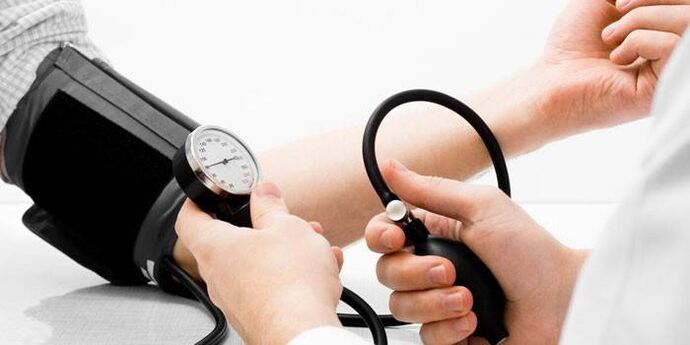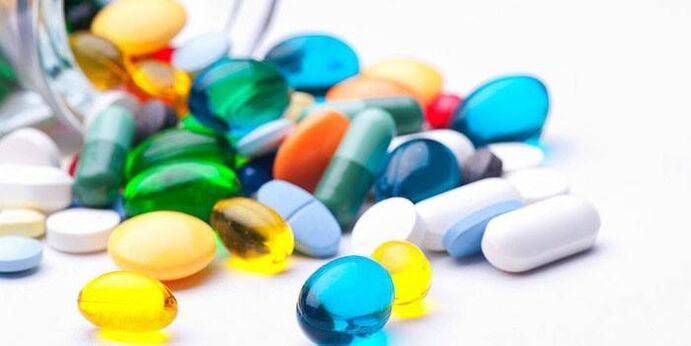With increasing blood pressure develops lethal pathology of the cardiovascular system. Characteristic jumps are dangerous to health, and in the absence of timely therapy, doctors do not rule out a hypertensive crisis. 30% of all patients have this problem, and the symptoms are constantly getting younger.
What is hypertension?
Arterial hypertension is an independent disease in which blood pressure is disturbed. In the past, only adult patients suffered from a characteristic disease, but now modern youth are also at risk. Untreated arterial hypertension can lead to disability and death.
When measuring the outlet pressure, a double reading is obtained. You can get a real clinical picture while deciphering it. The first value characterizes the systolic (upper) pressure corresponding to the force of contraction of the walls of the heart. The second is diastolic (low), which demonstrates pathogenesis during myocardial relaxation. Hypertension can be diagnosed at home using a classic tonometer, but clarification is required in a hospital setting.
Degrees
The pathological process attacks gradually, the symptoms increase significantly, the intensity is frightening and causes other heart problems. Hypertension in the body manifests itself in one of three degrees - what is it, the cardiologist will tell you. The conventional classification of a characteristic disease with brief features is presented below:
- The first degree is elementary. The increase in blood pressure is insignificant, limited to 139-159 / 90-99 mm Hg. Art. At first the symptom appears unexpectedly, then disappears invisibly. The pathology can still be treated.
- The second degree is moderate. Possible deviations from the norm remain within 160-180 / 100-110 mm Hg. Art. , however, it is almost impossible to stabilize this figure. The risk of hypertensive crisis increases.
- The third degree is pronounced. Deviations from the norm are alarming in scale, approaching 180 and above / 111 mm Hg. Art. If hypertension manifests itself in this way, the degree of pathological process leads to impaired heart function.

Species
The disease has several conditional classifications that help the specialist to characterize the clinical picture as accurately as possible, make an adequate diagnosis and select the most effective treatment to eliminate the symptoms of anxiety in a timely manner. All available types of hypertension are briefly described below:
- by etiology: arterial hypertension of primary and secondary forms;
- symptomatic (secondary) hypertension: drug, endocrine, hemodynamic, renal, neurogenic;
- with complications: hypertensive crisis, malignant or labile hypertension.
Causes of hypertension
It is important to study the etiology of the pathological process to ensure a long remission period. The main causes of hypertension are impaired blood circulation through the arteries, restricting the flow of the heart to the left ventricle. In modern medicine, there is a completely logical explanation for this - structural changes in blood vessels with age, the formation of blood clots and atherosclerotic plaques in their cavities.
In men
Women are more prone to a characteristic disease, but it can also develop in the male body. The main causes of hypertension in men are listed below, but experts advise to avoid such provocative factors and eliminate them from your life in a timely manner. This is:
- stressful situations;
- genetic predisposition;
- bad habits;
- injuries previously associated with circulatory disorders;
- age-related changes in blood vessels, loss of elasticity;
- alcoholism;
- a tendency or presence of one of the forms of obesity.

Among women
If a woman develops hypertension - you can find out what it is, in a meeting with a local therapist, a highly qualified specialist. The diagnosis is unpleasant, it is difficult to treat effectively. It is important to know the underlying causes of hypertension in women to prevent complications in a timely manner. This is:
- severe emotional shock, crisis, long-term stress;
- overweight, obesity;
- disturbed hormonal background;
- premenopausal condition;
- increase in blood cholesterol;
- the patient's age.
Symptoms of hypertension
Knowing what hypertension is, the patient must respond in a timely manner to changes in the general condition that is characteristic of the disease. It is not easy to differentiate hypertension, it is the duty of the doctor, so it is important not to delay the diagnosis. There is instability of blood pressure, which is subject to external stimuli. Other symptoms of hypertension depend on the sex of the potential cardiologist patient.
Among women
The weaker sex reacts sharply to the slightest change in health, so it is easier to recognize the appearance of a problem in their bodies. The disease can pass the patient in an "interesting situation". The main symptoms of hypertension in women are:
- spontaneous headache at different times of the day;
- visual acuity, loss of sharpness with sharp turns of the body and head;
- swelling of the lower extremities;
- excessive irritability;
- swelling of the face in the morning.

In men
At first, patients do not feel a change in their overall well-being, and the smallest illnesses are related to increased physical activity, extreme fatigue, or an environmental factor. Over time, the symptoms of hypertension in men become more pronounced, indicating progressive heart failure. This is:
- potential loss, sexual problems;
- decrease in concentration;
- increased shortness of breath;
- depression;
- flies in front of the eye syndrome with sudden movements.
Treatment
Knowing who the hypertensive patients are, we can say with confidence that these people have to "sit" on pills all their lives to maintain their overall health at a "satisfactory" price. There is no way to completely cure the disease, but it is quite possible to cure it. If you are interested in how to treat hypertension, the features of the conservative method are presented below. Required:
- Perform all necessary tests to determine the stage and form of the disease.
- Get rid of bad habits, go on a therapeutic diet.
- Take antihypertensive drugs regularly;
- Eliminate the risk of complications with regular examination by a specialist, folk remedies.

How to treat hypertension without medication
What to do with hypertension if you do not want to take antihypertensive drugs and have a negative attitude to drugs? Doctors recommend being outdoors more often, taking iron-containing multivitamin complexes to maintain a systemic circulation, giving up bad habits and choosing effective cardio exercises. Don't lead an isolated lifestyle. However, during the relapse phase, you still need to take hypertensive medication to avoid the risk of complications during myocardial infarction.
Diet for hypertension and heart disease
Therapeutic nutrition eliminates salt intake, aimed at managing the body's water balance. If you are diagnosed with hypertension - what it is, how to treat it, a cardiologist will tell you. For example, a diet for hypertension and heart disease involves the following restrictions on a patient's normal diet. The following foods are prohibited:
- caffeinated beverages;
- sharpness, acidity, smoked meat;
- sakatat;
- alcohol;
- fatty foods.
If it is chronic hypertension - what is it in terms of nutrition? Allowed:
- lean meat;
- unsalted grains;
- dairy products.





















